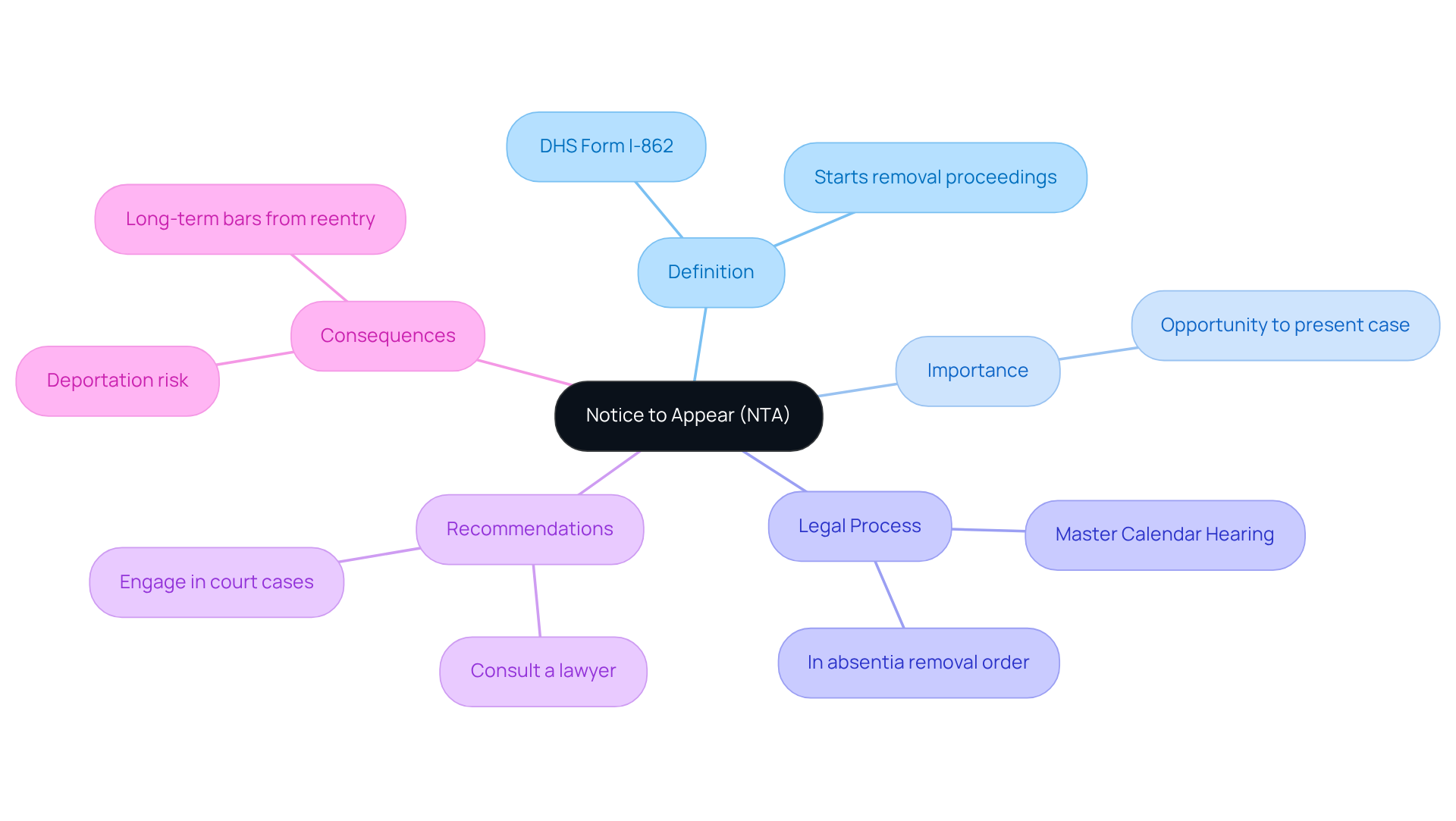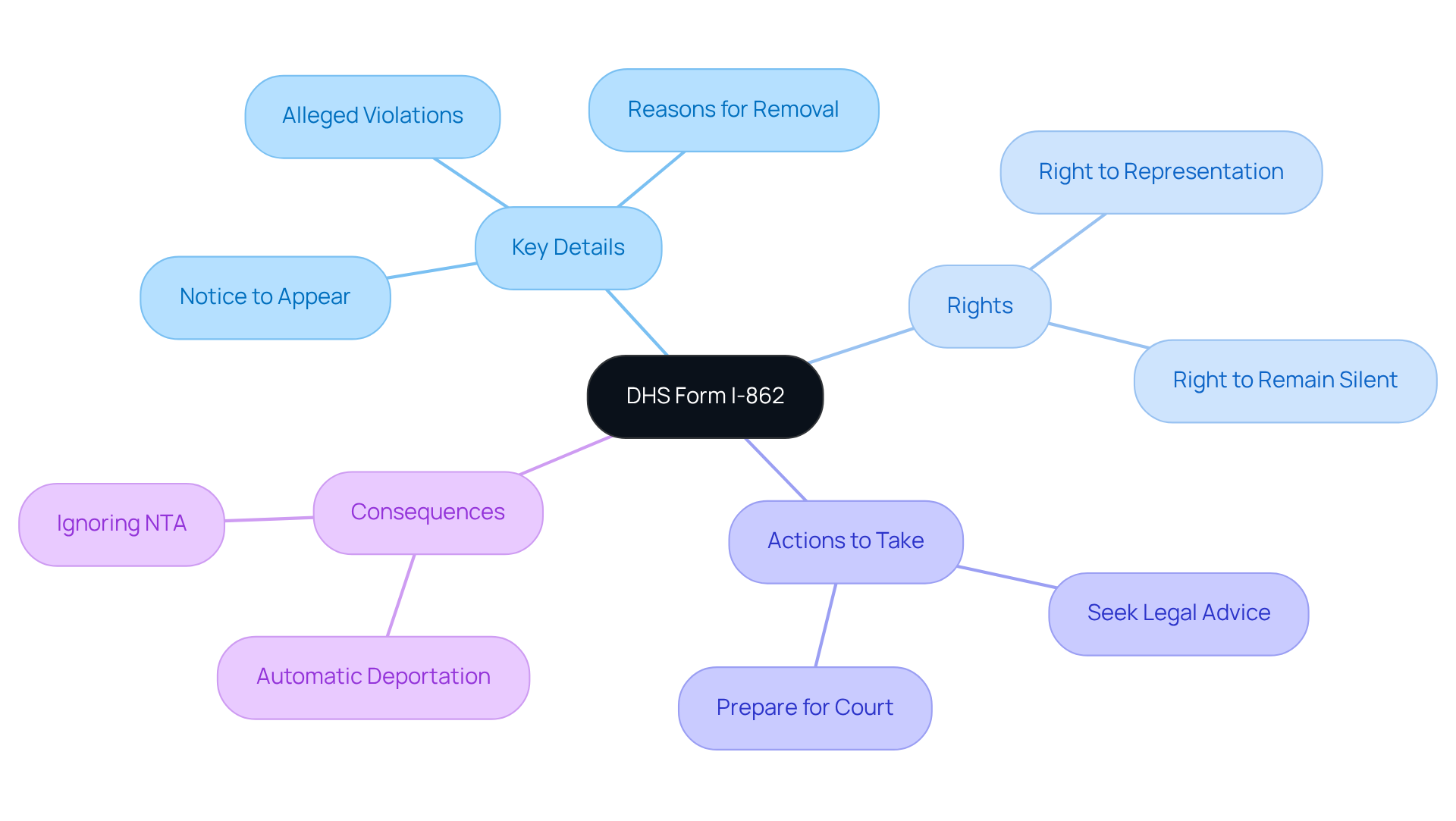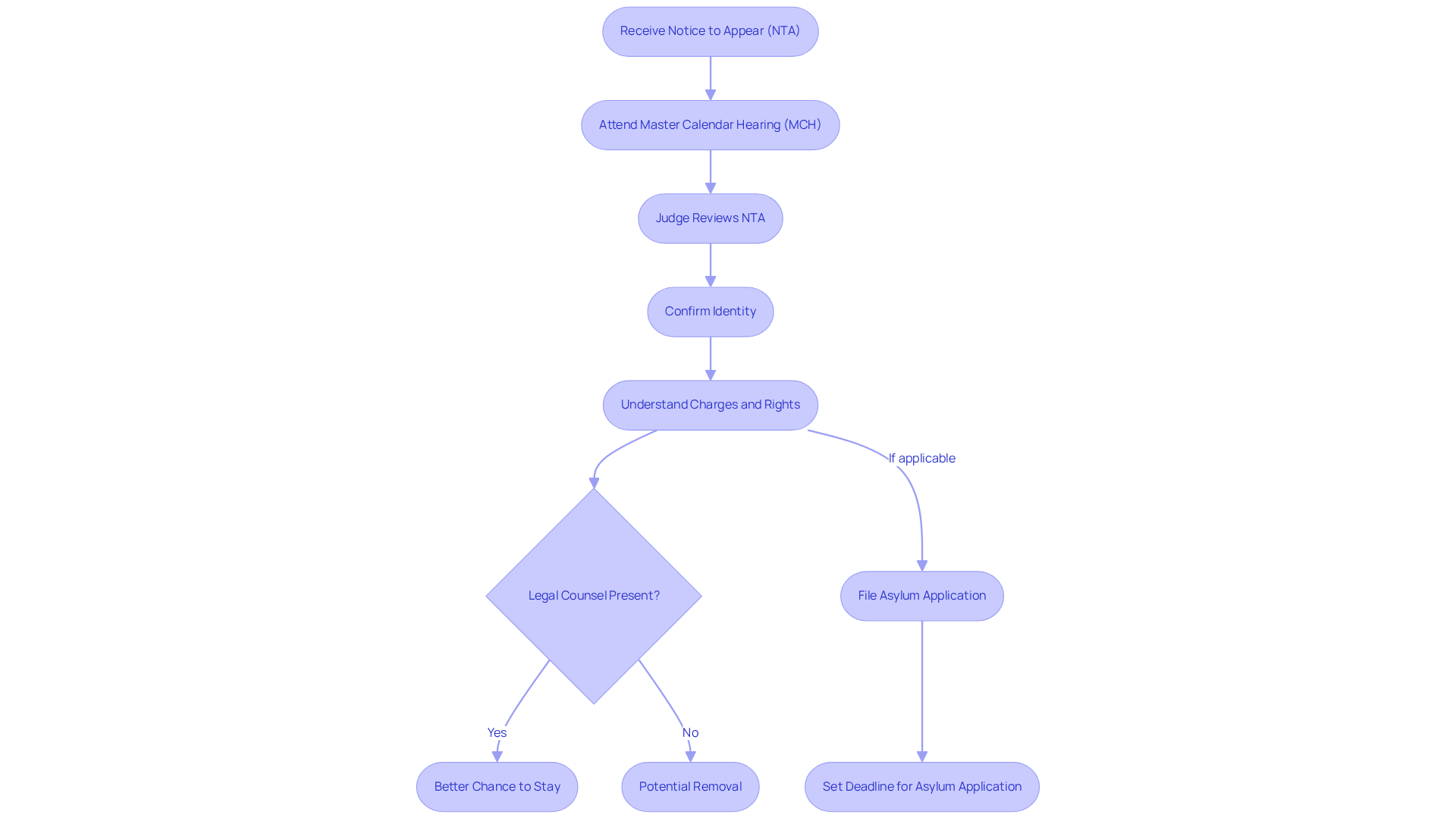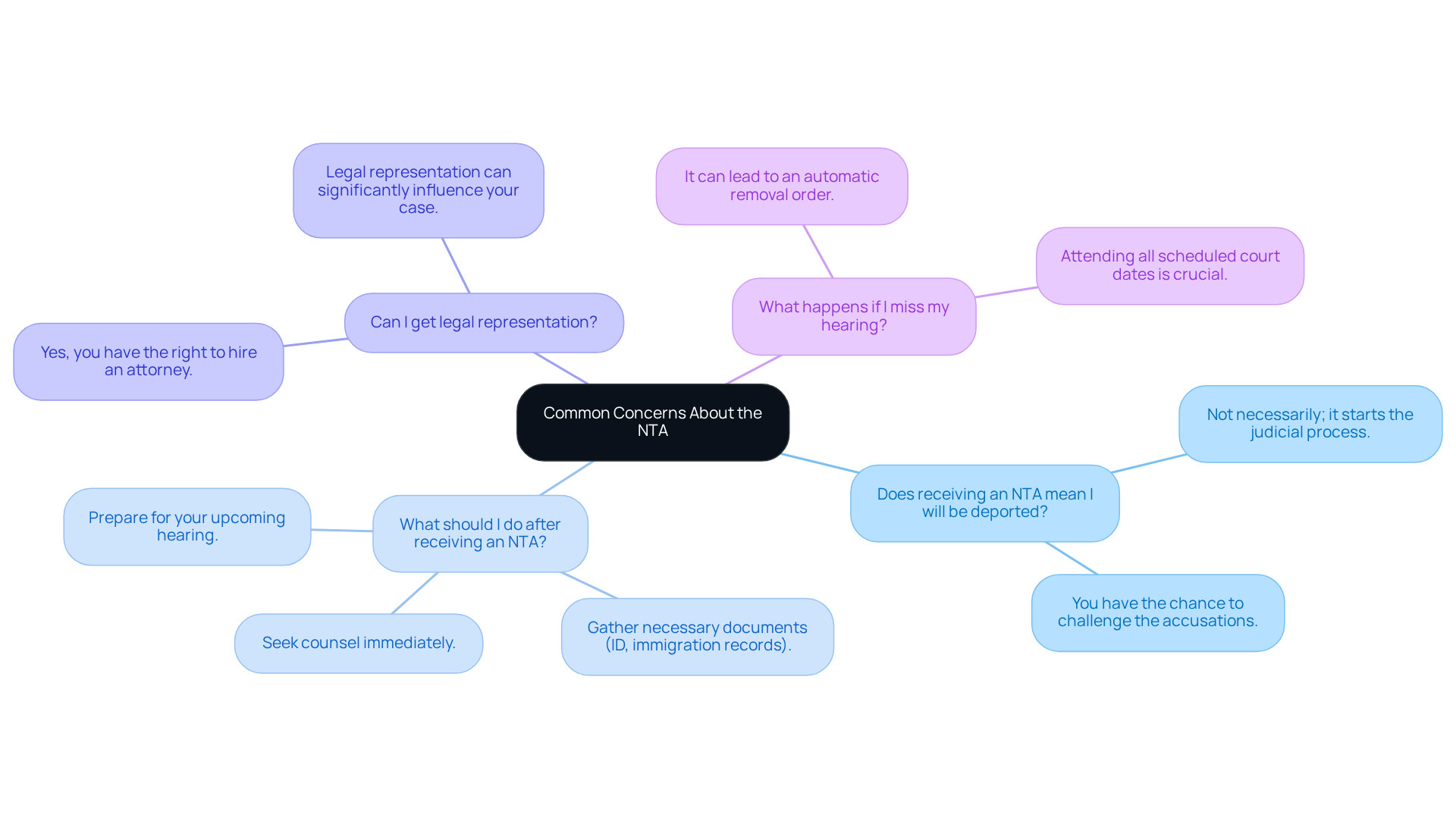Introduction
Receiving a Notice to Appear (NTA) can be a pivotal moment for immigrant workers. It marks the start of a complex legal journey that could significantly impact their residency status. Understanding DHS Form I-862 is crucial. This form not only outlines the government's intentions but also details the rights and options available to individuals facing removal proceedings.
Have you ever felt lost in the immigration process? It’s a daunting experience, but you don’t have to face it alone. This article delves into the intricacies of the NTA and DHS Form I-862, providing essential insights and guidance for those seeking to protect their future in the United States. We’re here to fight for your family and ensure your voice is heard in court.
Define the Notice to Appear (NTA)
A Notice to Appear (NTA) is a crucial legal document from the Department of Homeland Security (DHS) that is referred to as DHS Form I-862 and starts removal proceedings against a noncitizen. This document serves as a formal notification of the government's intent to deport, clearly outlining the reasons behind this action. It includes vital details like the date, time, and location of the required court appearance, along with the charges against the individual.
For newcomers, understanding the NTA and the DHS Form I-862 is essential. It marks the beginning of a legal process that can significantly affect their residency status. It’s important to remember: receiving an NTA doesn’t guarantee deportation. Instead, it opens the door for individuals to present their case before a judge. Consulting with an experienced lawyer right after getting an NTA is strongly recommended. They can provide guidance on possible defenses and help navigate the complexities of the legal system.
Recent updates to the NTA process underscore the need for timely responses and attendance at all scheduled hearings. Ignoring these can lead to severe consequences, including an in absentia removal order. Real-world examples show that those who actively engage in their court cases often achieve better outcomes. This highlights the importance of understanding and responding appropriately to the NTA.
We’re here to fight for your family. Your future matters to us.

Explore DHS Form I-862: Key Details and Implications
DHS Form I-862 serves as your official Notice to Appear in court regarding residency matters. It’s essential to examine this document closely. It holds vital information about your case, including the reasons for removal proceedings and any alleged violations of immigration law. Importantly, this form outlines your rights, including the right to representation.
At Vasquez Law Firm, we understand how overwhelming this can be. It’s crucial to grasp these details so you can take the right steps - like seeking advice and preparing for your court appearance. If you receive a DHS Form I-862 or face any enforcement actions, remember that you have the right to remain silent and the right to an attorney.
Acting quickly is key. Ignoring an NTA can lead to severe consequences, including automatic deportation. Don’t wait - reach out to Vasquez Law Firm at 1-844-967-3536. We’re available 24/7 for emergencies. Your future matters to us, and we’re here to fight for your family.

Understand the Hearing Process Following a Notice to Appear
Receiving a Notice to Appear (NTA) can be daunting. It means you’re scheduled for a Master Calendar Hearing (MCH) in court regarding your visa matters. This initial hearing is crucial. The judge will review the NTA, confirm your identity, and ensure you understand the charges and your rights. Attendance at the MCH is vital; if you fail to appear, it could lead to a default judgment and an in absentia order of removal. Did you know that 34 percent of respondents in immigration court miss their hearings? This statistic underscores just how important it is to be present.
During the MCH, the judge might ask if you wish to designate a country of removal and will check if you have legal counsel. If you haven’t filed an asylum application yet, the judge will typically set a deadline for you to do so. After the MCH, there may be additional hearings, including a Personal Merits Hearing, where you can present your case and defenses against the charges.
Consider this: individuals with legal representation have a significantly better chance of staying in the U.S. In fact, 59 percent of those facing deportation with a lawyer were allowed to remain. Conversely, 75 percent of those ordered removed last year did not have representation. This stark contrast highlights the importance of having professional counsel by your side.
Preparation is key. We strongly encourage you to seek representation to navigate the complexities of the immigration process effectively. An attorney can help gather all necessary documentation and ensure you’re ready to present your case, ultimately improving your chances of a favorable outcome. If you’re facing urgent legal issues, like receiving a subpoena or encountering ICE enforcement, remember: you have rights. Exercise your right to remain silent, request an attorney immediately, and don’t answer questions without your lawyer present.
We’re here to fight for your family. Contact us at Vasquez Law Firm for immediate assistance.

Address Common Concerns and FAQs About the NTA
Receiving a Notice to Appear (NTA) can feel overwhelming for many immigrants. It raises numerous questions and concerns. Let’s address some common FAQs:
-
Does receiving an NTA mean I will be deported? Not necessarily. An NTA kicks off the judicial process, giving you the chance to challenge the accusations against you. Deportation isn’t automatic.
-
What should I do after receiving an NTA? It’s crucial to seek counsel right away. Gather all necessary documents, like your ID and immigration records, and prepare for your upcoming hearing. This is your opportunity to present a strong case.
-
Can I get legal representation? Absolutely! You have the right to hire an attorney to represent you during these proceedings. Having legal representation can significantly influence the outcome of your case.
-
What happens if I miss my hearing? Missing a hearing can lead to an automatic removal order. This highlights the importance of attending all scheduled court dates. Many immigrants miss their immigration court hearings, which often results in unfavorable outcomes.
Addressing these concerns proactively can help you feel more prepared and less anxious about your legal situation. Engaging with a knowledgeable attorney can provide clarity and support during this challenging time. Remember, you’re not alone in this fight.

Conclusion
Understanding DHS Form I-862 and the associated Notice to Appear (NTA) is crucial for immigrant workers facing potential removal proceedings. This document marks the beginning of a legal process and offers a chance to contest deportation. It’s important to remember that receiving an NTA doesn’t mean automatic deportation; instead, it’s an opportunity to engage with the legal system and advocate for your rights.
Have you ever felt lost in the immigration process? Seeking legal representation immediately upon receiving an NTA can make all the difference. Statistics show a stark contrast in outcomes for those with legal counsel versus those without. Being prepared for court appearances is essential. Engaging proactively with the legal process, attending all hearings, and understanding your rights can significantly influence the trajectory of your immigration case.
The challenges posed by an NTA can feel overwhelming, but they are not insurmountable. Immigrants are encouraged to take action, seek legal assistance, and stay informed about their rights and responsibilities. This proactive approach not only enhances the chances of a favorable outcome but also empowers individuals to navigate the complexities of the immigration system with confidence.
Remember, we’re here to fight for your family. Your future matters to us. Yo Peleo - We Fight.
Frequently Asked Questions
What is a Notice to Appear (NTA)?
A Notice to Appear (NTA) is a legal document issued by the Department of Homeland Security (DHS), specifically known as DHS Form I-862, that initiates removal proceedings against a noncitizen.
What information does the NTA provide?
The NTA includes essential details such as the date, time, and location of the required court appearance, as well as the charges against the individual.
Does receiving an NTA guarantee deportation?
No, receiving an NTA does not guarantee deportation. It allows individuals to present their case before a judge.
What should individuals do upon receiving an NTA?
It is strongly recommended that individuals consult with an experienced lawyer immediately after receiving an NTA to understand possible defenses and navigate the legal system.
What are the consequences of ignoring an NTA?
Ignoring an NTA can lead to severe consequences, including an in absentia removal order, which can result in deportation without a hearing.
How can engaging in the court case affect the outcome?
Real-world examples indicate that individuals who actively engage in their court cases tend to achieve better outcomes, emphasizing the importance of responding appropriately to the NTA.




